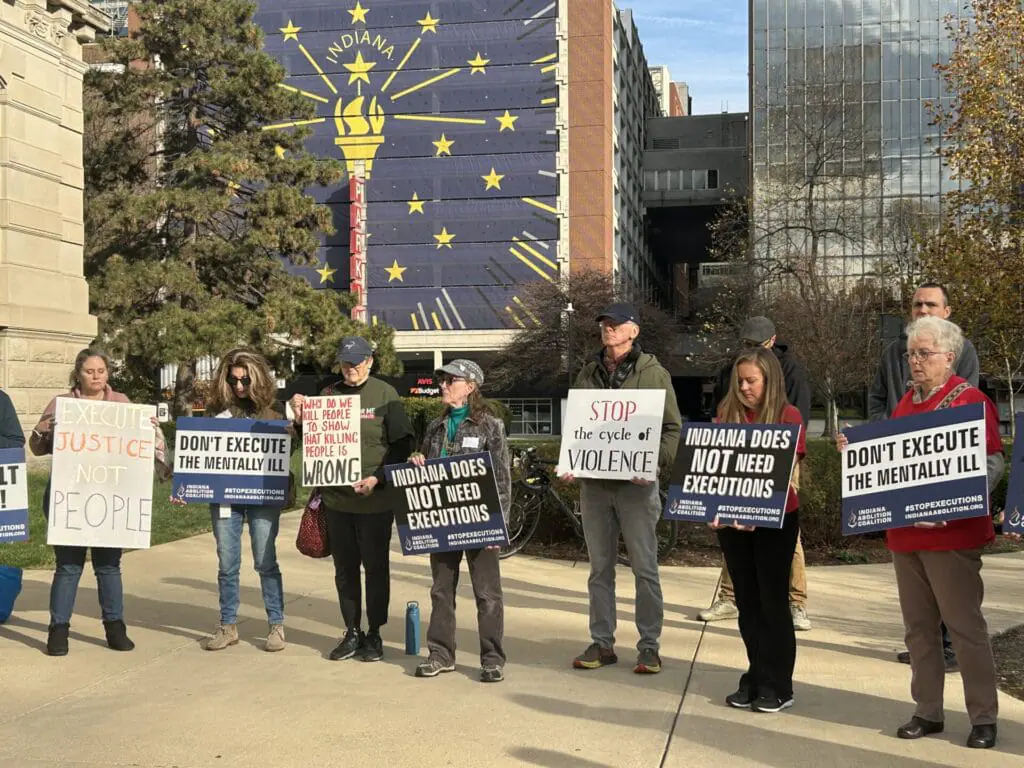Religious leaders protest the state’s death penalty
INDIANAPOLIS (WISH) — Religious leaders are demanding an end to the death penalty, specifically calling on Gov. Eric Holcomb to stop the Dec. 18 execution of Joseph Corcoran.
Dozens of protesters gathered on the steps of the Indiana State Capitol. If Holcomb goes ahead with Corcoran’s execution, it will be the first time in 15 years since the state’s last execution.
Sister Barbara Battista, a justice promoter at the Sisters of Providence, witnessed two executions first-hand.
“The government is about to put a man to death in our name and we have input. We have influence we are living in a democracy. We have access to our government. I want everyone who cares about human life and dignity to call, write, and email Governor Holcomb.”
At the foot of the steps is a giant Delaware bell. Created in 1992, the bell was rung by anti-death penalty advocates. Charles Keith, an impact community liaison for Death Penalty Action, said he wants everyone to hear it’s sound because it echoes the people who have died or are in death row unable to speak. It is the sound of people who are protesting.
“Delaware abolished the death penalty, so they no longer need it, and what we’re hoping is we go to other states and the same effect will happen,” Keith said. “They hear the bell ring, and they’ll end the death penalty.”
Joseph Corcoran was convicted of killing four people in Fort Wayne in 1997. Corcoran’s attorneys argued that he should be spared due to his mental illness (paranoid schizophrenia), but the state’s high court upheld the sentence.
“Seven days before the birth of Jesus, Governor Holcomb is going to have a person killed,” said Bill Breedon, a reverend at the Universal Unitarian Church.
Appeals and legal challenges have delayed Corcoran’s death sentence for years not to mention a lack of Pentobarbial, the drug needed for lethal injection.
“First of all, this is a drug that’s never been used in the state before,” said David Frank, president of Indiana Abolition Coalition. “It’s a procedure that’s never been used before, and we don’t know where the drug has been procured from.”
The drug was used in The United States Penitentiary, Terre Haute in the past for federal executions.
Frank said executions are costly. A 2015 fiscal report by Indiana General Assembly found the average cost of a death penalty trial was around $380,000, almost 10 times more than the cost of trials and appeals for life sentences.
The protesters here are hoping their message gets communicated to Gov. Holcomb, and they plan to continue their mission by reaching out to Governor-elect Mike Braun as well.

Related coverage
- Indiana death row inmate Joseph Corcoran files to reopen appeal window in death penalty case
- Attorneys for Indiana death row inmate call for Supreme Court to block execution
- Indiana death row inmate’s lawyers say mental illness should preclude him from execution
- Indiana attorney general seeking second execution date for convicted murderer
- Indiana calls for resumption of executions, starting with Fort Wayne murderer